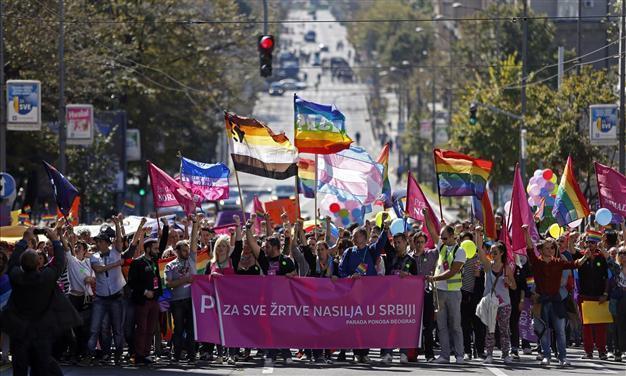Behind wall of police, Serbia hosts first Gay Pride since 2010
BELGRADE - Reuters

Gay activists wave flags during the Pride March in Belgrade, Serbia, Sunday, Sept. 28, 2014. Waving hundreds of rainbow-colored flags, several hundred gay activists marched from the government headquarters through the empty Belgrade streets where shops were closed and public transport was stopped. AP Photo
Gay rights activists in Serbia held their first Pride march in four years on Sept. 28, walking through Belgrade streets emptied of traffic and pedestrians by a massive security operation.
Thousands of riot police with armoured vehicles, water cannon, horses and shields sealed off streets leading to the site of the short march from the government headquarters to parliament, to prevent a repeat of running battles with hardline nationalists and football hooligans that took place in 2010.
Authorities banned Pride for the next three years, citing security concerns. Homophobia is widespread in Serbia and other conservative societies in the Balkans; the head of the Serbian Orthodox Church last week compared homosexuality to paedophilia and incest.
But with Serbia setting out on talks to join the European Union, the bloc has made clear it sees Pride as a litmus test of the country's commitment to defend the human rights of all.
Hundreds of people took part, waving rainbow flags and blowing whistles as a police helicopter flew low over the city. "I feel phenomenal. Our efforts of the past three years have borne fruit," said Pride organiser Boban Stojanovic.
Asked about the scale of the police operation, co-organiser Goran Miletic told Reuters: "This is the Serbian version of the right to free assembly and speech."
Prime Minister Aleksandar Vucic, a former ultranationalist who has rebranded himself as a pro-Western reformer, said on Thursday he had "no intention" of joining the march, but several of his ministers and the mayor of Belgrade turned out.
"This is testimony to the fact that in Belgrade everyone is equal," said mayor Sinisa Mali, a close ally of Vucic.
There was no sign of the groups of hooligans and nationalists that rioted in 2010 in response to the previous march.
An opponent standing at the edge of cordon, who gave his name as Mihailo, said: "It's shameful that we should block the capital to allow a few hundred individuals to demonstrate their perverted ideas. We're entering Europe at the cost of every single Christian value."
